

|
|
|

|
|
|
GOOGLING LIBRARIES a MobyLives guest column by Christopher Allen Waldrop |
|
| 10 January 2005 —In 1997 I attended a talk about the future of libraries and the Internet. It was the first time I heard it suggested that the Internet could potentially replace the traditional library: With the increasing availability of information online eventually there wouldn't be a need for a physical library building to hold books and periodicals. It was suggested that this change could occur in as little as ten years, but so far it doesn't look like that's going to happen. In spite of the increasing availability of information in electronic formats no one's rushing to turn the local library into a golf course; in fact in the past decade many cities and universities have purposely invested in new buildings or renovation to accommodate new technology, as well as more books. If anything technology means new opportunities for libraries. Still some librarians worry that the Internet's going to put them out of a job. The recent beta testing of Google Scholar, and the announcement that Google Print would be working with libraries at Harvard, Oxford, Stanford, the University of Michigan, as well as the New York Public Library hasn't done anything to help put those fears aside. However the reality is much more complicated. Even though their new products are being billed as attempts to compete with Microsoft and Yahoo!, Google is also threatening to step on the toes of companies that serve libraries almost exclusively. Proquest, Ingenta, H.W. Wilson, and others already have searchable databases of full–text periodicals and abstracts. Meanwhile publishers, including Elsevier, John Wiley, and Blackwell have created similar full–text databases of their own periodicals. The disadvantage for libraries is that these products require pretty hefty subscription fees based on different factors such as number of users, the number of titles the library subscribes to, or even the number of hits. For library users there's an even more important downside: these databases are designed for scholarly use, and since no two are alike there's a learning curve with each one. The beauty of Google is its simplicity; it's like a virtual reference librarian. Ask Google a question, and while it won't give you an answer it can help you figure out where to go. Google Scholar would seem to be Google's answer to the periodical search engine, although it's already been hit with a lawsuit for trademark infringement by the American Chemical Society which has a product called SciFinder Scholar. The lawsuit is still pending, and Google seems set to step in and give libraries exactly what they need: a free resource that provides the greatest possible access to information. The catch, in addition to Google being cagey about its definition of "scholarly," is that users get a mixed bag of hits. Sometimes there's a link to a full–text article, but users are just as likely to get a search result labeled [book] and a link to search by zip code for the nearest library with that book in its stacks. Even more frustrating is the label [citation], which may mean ³book² but doesn't include the library search option. And while it's possible to find article citations there's no guarantee a user will get a full–text article. In most library databases users can limit their searches to full–text articles, so unless they just want citations they're better off using one of those. Google Print will theoretically take things a step further by making whole books available to users through a simple search. However Google's digital library project doesn't necessarily provide any better benefits than going to a library's web catalog. Although their press release says, "With the addition of books from our library partners, our book selection will continue to increase, and you'll also be able to find out of print, rare and public domain books," the emphasis should be on public domain books. As the "About Google Print" page explains, a book will only be available in its entirety if it "has no copyright restrictions and is considered public domain." In a clarifying e–mail to me, they added, "We'll also show a few pages from books when we have an agreement to do so with the publisher." Google is soliciting the cooperation of publishers with the promise that they'll increase their books' visibility and attract customers, as well as earning money from ads targeted to their content. It remains to be seen how many publishers will go for this, or how much money there really is to be made. Meanwhile the University of Michigan and Stanford may digitize their entire collection, but only public domain books will actually be available online. This isn't to say Google's entirely bad. In many ways Google is expanding the traditional library's boundaries but keeping the ideal of making information freely available to anyone. The increased emphasis on scanning books will, hopefully, push this technology and make it cheaper, faster, and more effective. Space and time have always been the biggest enemies of libraries, and scanning means versions of the most rare and fragile documents can be made freely available while the originals are kept in controlled environments. It may even be in Google's interests to help libraries fight legislation like the 1998 Sonny Bono Copyright Extension Act and its restrictions upon the public domain. On the other hand, Google is a profit–driven corporation, whereas most libraries (including the ones currently working with Google) are non–profit. Since Google's revenue comes from selling ads it's not clear whether search hits will lean more towards results that push products. And although remote, it's also a possibility that Google will exercise editorial control, restricting access to information at the behest of advertisers or shareholders. The quantity of information available may make such control impossible, but it also means that users won't necessarily know when access to information is being denied. Many librarians believe they're competing with and losing against search engines like Google, that for most users the convenience of a simple, clean interface outweighs the quality of the quality of the results. Whether this is true or not Google's digital library project is an opportunity for libraries to remain competitive by working with the competition. For the sake of users, and their own future, libraries just have to make sure they're taking advantage of the opportunity and not being taken advantage of. Librarian CHIRSTOPHER ALLEN WALDROP is the Serials Coordinator at the Vanderbilt University Library in Nashville, Tennessee. Link to this column. ©2005 Christopher Allen Waldrop Previous column; BLUE CHRISTMAS ... Booksellers are reputed to be stallwart lefties, but guess who "the world's biggest bookseller" is giving its corporate donations to. ©2005 Christopher Allen Waldrop |

|
||
|
Don't want to register for a site but need log on i.d.s and passwords? Get them at BugMeNot.com. MobyLives towers above all other literary weblogs. — The Complete Review Friday 14 January 2005 Judge declares Cobb County residents must evolve . . . "A federal judge in Atlanta, Georgia, has ruled that a suburban county school district's textbook stickers referring to evolution as 'a theory not a fact' are unconstitutional" because it violates the separation of church and state, according to a report on CNN.com. In a suit brought by five parents and joined the ACLU to protest the move by the Cobb County, George school system, U.S. District Judge Clarence Cooper "ruled that labeling evolution a 'theory' played on the popular definition of the word as a 'hunch' and could confuse students." Said the judge, "the distinction of evolution as a theory rather than a fact is the distinction that religiously motivated individuals have specifically asked school boards to make in the most recent anti–evolution movement, and that was exactly what parents in Cobb County did in this case. By adopting this specific language, even if at the direction of counsel, the Cobb County School Board appears to have sided with these religiously motivated individuals." The stickers, he said, sends "a message that the school board agrees with the beliefs of Christian fundamentalists and creationists. The school board has effectively improperly entangled itself with religion by appearing to take a position. Therefore, the sticker must be removed from all of the textbooks into which it has been placed." A change is gonna come, says PW's Nelson . . . "I think I have been unconsciously moving toward this, or something like this, for a long time," says Sara Nelson, the new editor of Publishers Weekly in an extensive interview with Media Bistro's David S. Hirschman. As for what's coming at the industry's leading magazine, "It's really going to look very different than it does now" in short order, she says. She tells Hirschman that she see the main competition as Publisher's Lunch and Publisher's Marketplace, as well as the forthcoming BookStandard.com. At the same time, she seems to imply PW has the advantage, saying, "I believe that Publishers Weekly does at least three things and the nearest competition does some of those three things but not all of them." She doesn't clarify further, but she does say that "I think PW needs a lot of changing and I think everyone in the industry agrees on that . . . . There's a lot that needs to be fixed, updated, etc. But the truth is that it really is the brand of the industry, and that it just needs to be spruced up and shined up and modernized." And she's very clear on one other thing: "I read some non-fiction but I'm really a fiction person." When a design school opens a new bookstore . . . The bookstore at "the nation's oldest and largest art and design school," the Pratt Institute, "is determined to be more than just another college bookstore," as Suzanne Hamlin reports in a New York Times story. Opening this month, the $2.2 million store, designed by Pratt's own Richard Scherr, "has been purposely built to serve both town and gown," says Hamlin. The store, located on the edge of the campus in a "multiethnic, mixed–economic" area, is "a 15,000–square–foot soaring space, is a warehouse of books, publications and tools for every category of the arts. It combines bits of art shops and bookstores like Barnes & Noble, Rizzoli, MoMA, Pearl Paint and the Harvard Coop, all together in a wide-open merchandise display." Says Pratt president Thomas F. Schutte, "There is nothing else quite like it anywhere in the country. Obviously, it will be a tremendous resource for our students but, because of its location, for the community as well." The significance of poetry prizes . . . "These days, for young and/or new poets, prizes seem less like an honour, the cherry on the proverbial top of the cake, than a mandatory requirement," writes Kathryn Gray in an essay for BookNinja.com. But when she heard she was nominated for the T.S. Eliot Prize for her very first book of poems, The Never–Never, she had to admit, "it's nice to be passed the ball just this once . . . Knowing that such moments are few — and rightly so — adds a certain sweetness to the occasion and provides the added security that I might happily slip back into oblivion at any moment. My art is safe, but my ego is massaged." Gray finds out Monday if she won. They did agree, however, that it must be difficult to be named Pius . . . "A book with 'sex god' in its title should stay on the shelves of Bozeman's middle school libraries," the Bozeman School District's Learning Materials Review Committee agreed unanimously Wednesday, drawing applause from the 40 parents in attendance. As Gail Schontzler reports in a Bozeman Daily Chronicle story, the committee was considering Louise Rennison's On the Bright Side, I'm Now the Girlfriend of a Sex God, which it deemd "a funny, innocent book about a teenage girl." Donated to the school by a parent, the school librarian reported that the five copies regularly "fly off the shelves." But one parent, Pius Ruby, "objected to the book's title" and argued that the term "sex god," "could encourage young girls to approach older boys or men and thus lead to statutory rape." Schontzler reports "Ruby's voice quavered as he argued for protecting America's children." However, "supporters argued the term should be considered English slang for 'hunk' or 'hotty.'" NOTE: Daily newspapers often change URLs when archiving, so some links won't work beyond the day they're first posted. Thursday 13 January 2005 They're changing the secret handshake, too . . . Just a few months after the searing critique of the Iraq war Imperial Hubris: How the West is Losing the War on Terrorism, became a bestseller, the CIA has announced it is "drafting new rules for agency employees who want to become authors." The book's cover identifies the author as "Anonymous", but it was widely known to have been written by CIA agent Michael Scheuer, who later admitted it publicly and resigned from the agency in November "to speak more publicly on problems in the war on terrorism." As an Associated Press wire story reports, "Scheuer's 309-page book on the U.S. government's Middle East policy is widely believed to have angered senior White House officials during the election year." Now, "the changes, first disclosed by former agency officials, have raised concerns among some intelligence veterans that the CIA may try to further censor the already–limited speech of agency employees." The new rules would require employees to submit their manuscripts to a Publications Review Board for approval. One ex–agent says the scuttlebut is that new chief Porter Goss "is going to put the kibosh on people writing articles or books or talking to the press in any form." Cheeky smegger fires magnificent ass . . . Waterstone's bookstore employee who lost his job because of things he said about the store on his blog continues to get widespread attention. Yesterday' Guardian, in a story by Patrick Barkham, reported that the firing of Joe Gordon has " alarmed the global internet community. Mr Gordon has received dozens of emails from other bloggers who have heard about his plight, with some pledging to boycott Waterstone's." Gordon talks about what it feels like to be the subject of such scrutiny on the blog in question, while a spokeswoman for the chain retailer still wouldn't comment on the reasons for the firing but did say Gordon "has two opportunities to appeal after he receives his letter of dismissal through the post." Meanwhile, the Retail Books Association, "which represents 6,000 people working in the book trade, said it would help Mr Gordon appeal against his dismissal." So what did Gordon say on his blog? The Guardian runs some excerpts: "Tuesday, Nov 16 . . . Evil Boss then has cheek to ask me to work one of the bloody bank holidays in the week he refused me off. Cheeky smegger. Said no. Noticing he has put me down for one of those days anyway, the sandal–wearing bastard. Words will be exchanged — if he gives me my birthday off I will do his bank holiday day. If not, he can kiss my magnificent Celtic ass . . . ." The Da Vinci con? . . . The Da Vinci Code author Dan Brown and reps from his publisher Random House were in a federal courthouse in Manhattan yesterday denying charges that he had "lifted material for his bestseller from another book." As Carl Campanile reports in a New York Post story, "Brown's lawyer urged Judge George Daniels to toss out copyright–infringement claims made by rival author Lewis Perdue," who says "Brown lifted plot material from two of his books — 'The Da Vinci Legacy' and 'Daughter of God' — and used it in 'The Da Vinci Code.'" The judge said he will issue a ruling in the spring. It was a chain Christmas . . . Barnes & Noble, and despite downward trends elsewhere in the book business over the holiday season, Borders had an even better than expected Christams, according to a CBS MarketWatch.com report by Carolyn Pritchard. "The Ann Arbor, Mich.–based retailer said sales from Oct. 25 through Jan. 9 rose 4.8 percent to $1.2 billion, with sales at its Borders stores increasing 4 percent to $763 million," writes Pritchard. CEO Gret Josefowicz says, "Overall, holiday 2004 was a bit better than expected in Borders superstores driven primarily by strength in book sales. This year, we saw sales improve later in the holiday season and those trends have continued, driven in part by gift card redemptions." From the Glad We Could Clear That Up department . . . John Ruskin, was repulsed when, after the death of his hero, painter J.M.W. Turner, he discovered that Turner had painted an "enormous cache of Turner material" that was comprised of "sketches of naked women and nudes of both sexes in erotic entanglements . . . most likely inspired by Turner's trips to brothels and other places of ill repute." Legend has it that Ruskin "was so horrified by the erotic drawings" that "he burned them on a bonfire." However now, says Sarah Lyall in a New York Times story, Ian Warrell, "a Turner expert and curator at the Tate Britain, says that a painstaking trawl through Turner's work has led him to conclude that most, if not all, the erotic art still remains in the collection and that the bonfire, said to have occurred in 1858, almost certainly never happened." Or, as Lyall puts it, "like the similarly titillating tale that attributes Ruskin's failure to consummate his marriage to his revulsion at the sight of his bride's pubic hair, the story might not be true." NOTE: Daily newspapers often change URLs when archiving, so some links won't work beyond the day they're first posted. Wednesday 12 January 2005 Mississippi un–banning . . . Although one member protested that "Our libraries are not a trash bin for pornographic materials," he was overruled and the board of the Jackson–George Regional Library System voted 5–2 to reverse its ban of Jon Stewart's America: The Book, according to an Associated Press wire story (here carried in the Biloxi Sun Herald). The move comes a day after the ban drew world–wide attention to the Mississippi library system. Director Robert Willits noted, "We got some absolutely nasty e-mails and telephone calls that you would not believe," Willits said. BOMC resumes its identity crisis . . . Falling membership in the Book–of–the–Month Club did not stop falling when its owner, Bertelsman, merged its book clubs with those of Time Warner to form Bookspan; the prestigious old club has lost over a million members since the late 1980s. So, as Ed Wyatt reports in a New York Times story, BOMC is making some sweeping changes including "the elimination of the panel of literary judges that each month choose the club's prestigious main selection." (The panel, which was only put back into place in 2001 after having been dropped in 1994, consisted of Annie Proulx, Anna Quindlen, Bill Bryson and Nelson DeMille.) But most of its changes seem geared toward making BOMC more like its Internet competitors: "Club members will still receive 17 mailings a year, each with a monthly selection that they can accept or reject, but those books will be chosen by the club's staff based on a member's previous purchases and expressed interests, much like the recommendations of Amazon.com," reports Wyatt. "Another new feature, Booksearch Plus, allows members to shop for books outside the regular club offerings, making the club more like other Internet book retailers. And like Amazon, Barnes & Noble.com and other online retailers, the club will waive shipping charges on purchases of $25 or more." The real tie up was over how to interpret "is" . . . In an effort to ensure a good translation and yet do something to put an end to "fabrications in pirated copies," Bill Clinton has struck a deal with a Chinese publisher for an official version of his memoirs to be published in China. According to an Associated Press wire report by David Hammer, Clinton wanted to make sure the translation "would make it clear that I have both differences in policy (from the Chinese) and a long–term commitment to reconciliation." At the same time, said Bob Barnett, the Washington attorney who negotiated the deal with Yilin Press, said "it was important to publish an official version of the best seller in China, because a vast piracy market had produced versions that inserted inaccuracies and changed facts." For example, some of the pirated versions "had a young Clinton praising China's Communist revolutionary Mao Zedong or Clinton talking about the feng–shui in his home state of Arkansas." Harry Potter and the early edition . . . Last month, J.K. Rowling announced that she had just completed writing the newest book in the Harry Potter series. Monday, authorities closed down a site purporting to offer an electronic version of the book for $9.95. As Caroline Briggs reports in a BBC News wire story, the site claimed it had an e–text of Harry Potter and the Half–Blood Prince "six months before the eagerly–awaited book is due to be published on 16 July." One observer, Melissa Anelli, managing editor for a Potter fan site called "The Leaky Cauldron," theorized that the site was "fishing for credit card numbers." Ah, that's more like it . . . Feminist icon and Female Eunuch author Germaine Greer who first "baffled observers" by agreeing to appear on the British reality TV show "Celebrity Big Brother," "quit the program Tuesday and launched a scathing attack on the producers." According to an Associated Press wire report, "after five days of being locked in a house with an underwear model, a teenage musician, a drug-loving dancer and an ex–wife of Sylvester Stallone," Greer held a press conference and called the house a "fascist prison." NOTE: Daily newspapers often change URLs when archiving, so some links won't work beyond the day they're first posted. Tuesday 11 January 2005 Mississippi banning . . . "I've been a librarian for 40 years and this is the only book I've objected to so strongly that I wouldn't allow it to circulate . . . If they had published the book without that one picture, that one page, we'd have the book," says Robert Willits, the director of the Jackson–George Regional Library System of eight libraries in Mississippi, explaining why the system has banned Jon Stewart's America: The Book. As an Associated Press wire story further explains, the picture Willits is referring to is "features the faces of the nine Supreme Court justices superimposed over naked bodies. The facing page has cutouts of the justices' robes, complete with a caption asking readers to 'restore their dignity by matching each justice with his or her respective robe.'" Evil boss at Bastardstone's fires innocent employee for blogging. . . A long–time employee of a Waterstone's bookstore in Edinburgh, Scotland has been dismissed by the chain because of things he said about the store on his blog. As Jo Best reports in a CNET News wire story, Joe Gordon, worked for the chain outlet for 11 years, and has run his website, Woolamaloo Gazette, even longer than that (since 1992). He maintains that comments made on the site about his employer "should have been taken light-heartedly and were meant to be reminiscent of a Dilbert cartoon." But "Although Waterstone's has no employee policy that deals with blogging, according to Gordon, the chain said that Gordon's site had brought it into disrepute." The company cited specifically Gordon's references to his "evil boss" at "Bastardstone's." • MORE: Meanwhile, at the Woolamaloo Gazette, outraged fans are writing in to Gordon, such as author Richard Morgan, who cc'd Gordon on a letter he wrote to Waterstone's management: "I have to say I think this bears comparison with taking disciplinary action based on private conversation overheard in a pub, and raises some disturbing issues of freedom of speech." Pearson falls down badger hole . . . To giant publishing conglomerate Pearson, owner of Penguin and the Financial Times newspaper, it was "potential paradise": a "massive book distribution center" in Rugby, Warwickshire, with state–of–the&#art equipment." It was somewhat of an engineering marvel, where "the building design was careful not to impact on existing badger setts and foraging tunnels were built beneath access roads." Inside, its "446,000 sq ft of floor promised efficiency" for the distribution of Pearson's giant academic publisher Pearson Education and for Penguin, says Guy Dennis. But, as he explains in a Sunday Telegraph report, "In practice, the new facility rolled out last spring as smoothly as a bouncing rugby ball, dragging Penguin's venerable name through the mud. Quite simply, the distribution centre didn't work. The software failed. Chaos ensued." Dennis reports "books weren't delivered to shops, infuriating retailers and authors alike," and as a result the Society of Authors is considering legal action. Meanwhile, the problems are getting worse: "As a result of disruption to UK distribution and a slowdown in the US consumer publishing industry in recent months, Penguin's full–year profits are likely to be around the low end of current market expectations," says Dennis. They're baaaack! . . . The new Sony Librie may be the e–book reader of the future. In a brief report for PC Magazine, Critic Sascha Segan says at a recent show "it turned all of our heads with its incredible screen technology. Text on the thin, light Librie's screen looks just like newsprint. It's calm, gray, and readable in a way no other screen is." The fight over modernizing Arabic . . . "If you read a medieval English or French text, for example, it is difficult to grasp its meaning," observes Zeina Hashem Bec. But "Old texts written in Classical Arabic such as the Koran or ancient Arabic poetry remain fairly comprehensible to the average reader today because of their closeness to Modern Standard Arabic. Even the oldest Arabic inscription (328 A.D.), an epitaph from a tomb located about 100 kilometers southwest of Damascus called the Namara inscription, is extremely close to Classical Arabic." As Bec reports in story for Beirut's Daily Star, this has led to a "debate is raging" in "the corridors of Arab academia" as a result: " Why hasn't Arabic drastically changed in ? Is there a need to make any changes to it? What are the suggested ways of altering, or as some put it, 'modernizing' it? And, is Arabic, like Latin before it, threatened by extinction?" Says one professor, "I don't think that the Arabic language develops. It grows." Says Bec, "it is getting quite tense." The poet exits . . . January 7 was the 33rd anniversary of the suicide of John Berryman. As Robert Lacy writes in an essay for Poetry Daily, "Art Hitman, a carpenter employed by the university, was on the bridge at the time and saw what happened. 'He jumped up on the railing, sat down and quickly leaned forward,' Hitman told the Minneapolis Tribune. 'He never looked back at all.' Hitman's account, which appeared the next morning, January 8, on the front page of the Tribune, sounds very authoritative. But another eyewitness, a campus police spokesman, as reported in the afternoon Minneapolis Star on January 7, said that Berryman 'waved goodbye' to him before he jumped. So: a mystery, and a contradiction. Did he look back or didn't he? Did he wave goodbye or not?" NOTE: Daily newspapers often change URLs when archiving, so some links won't work beyond the day they're first posted. Monday 10 January 2005 Doctor, it hurts when I do this . . . "Book publishing really lies somewhere between art and commerce," observes Luke Johnson, adding, "in some aspects it is a barely rational industry." In fact, he says, it is "a poorly paid profession and generally a terrible business." In a blistering commentary for The Daily Telegraph, he explains that, Most authors receive pitiful advances which are rarely earned out. Salaries among staff in publishing houses are notoriously low. And owners of imprints must mostly do it for the love, since it is an endemically unprofitable industry." Those publishers, he explained, have it worst: "You pay authors upfront for manuscripts that might not arrive for years; you then ship finished volumes to booksellers who only accept them on a sale or return basis, and demand at least 55 per cent trade discount, and pay 120 days later." So why do people do it? Johnson says, "it is ferociously competitive because so many participants do it for uneconomic reasons. They understand that books are central to civilization." Aye Write! You come! . . . The city of Glascow has announced the Aye Write! literary festival, the city's first such ever, which will "largely take place in the city's landmark public library, the Mitchell, and will feature a host of Scottish writers such as Liz Lochhead, Louise Welsh, Zoe Strachan, Edwin Morgan and William McIlvanny." As a Glascow Herald report by Phil Miller notes, the event, slated to take place from 19–27 February, will also feature visiting writers William Boyd, Ian McEwan, former Monty Python member (and children's book author) Terry Jones, and new Orange Prize winner Andrea Levy. Says poet and playwright Lochhead, "It is so good this is happening and it's about time. Some of us have been charging off all over the UK to literary festivals for years so it is about time we have one here. Although there have been wee things, there has never been anything on this scale." Organizers hope the event will become an annual affair. Helping California's libraries . . . With the closing of the public libraries in Salinas, California—John Steinbeck's hometown—critic David Kipen wonders "What, in addition to the always enjoyable wallowing in voluptuous despair, can be done?" In a San Francisco Chronicle commentary, he observes that, "For one thing, of course, libraries need more funding. They share this need, at the moment, with schools, health care, job training, foreign aid and just about everything else except the war — thanks to which, none of these should be expecting much help any time soon." But what if the current funding was, at least, "much more equitably distributed"? He makes the proposal, and the argument, for "a sister library system" within a given region, because it "would strengthen ties between libraries, and help draw statewide attention to local funding crises before they reach the padlock stage." For example, he says, "There's simply no excuse for a system in which San Francisco embarks on an ambitious branch library renovation and construction program while, just down the 101, the next John Steinbeck can't check out a book by the last one." RIP: Pierre Daninos . . . Pierre Daninos, the French novelist who had a million–selling hit in the 1950s with a book that "makes fun of Englishmen," has died at the age of 91. As a brief obituary from the Agence France Presse notes, his book, The Diary of Major Thompson, which portrayed "Major W. Marmaduke Thompson," a "humorous Englishman living in France, trying to adapt to French ways," sold 1.19 million copies in France alone. You could—and may have to—look it up . . . Worried because "Nine out of 10 people with mild or moderate depression do no receive any treatment at all," doctors in Devon, England, are prescribing something other than medication: self–help books. As Anushka Asthana reports in a story for The Observer, "the scheme was developed following recommendations in a government report, Self–help interventions for mental health problems. By the summer there will be 80 self–help clinics in Devon, all using books based on cognitive behavioural therapy." Depression patient Jan Ap–Thomas says a book—Overcoming Depression, by Professor Paul Gilbert—"played a large part in her recovery." She says, "The best thing about these books are they are full of case studies that make you realise you are not alone. Depression means you feel extremely isolated. [The books] also remove the stigma as you can do it in the privacy of your home. For me, the antidepressants stopped working but the book did not and it meant I was making myself better instead of relying on someone else." Fill in your own phoning it in joke here . . . Saying that she finds book tours are made up of "angst, inconvenience, starvation, sitting in airports, and eating out of minibars," Margaret Atwood has invented "a remote book–signing machine that will allow readers to get their novels autographed without the author having to traipse to bookshops." As Charlotte Higgens reports in a story for The Guardian, "Although the invention will obviate the need for Atwood to sally forth from Toronto, it will require a little more input from her than Donald Rumsfeld offered when he used an automated signature writer to autograph letters to relatives of US soldiers killed in Iraq." NOTE: Daily newspapers often change URLs when archiving, so some links won't work beyond the day they're first posted. |
||

AVAILABLE NOW!
This week's fiction:
Zembla: The Official Site of the Vladimir Nabokov Society
Everyone Who's Anyone in Adult Trade Publishing
Author interviews at IdentityTheory.com
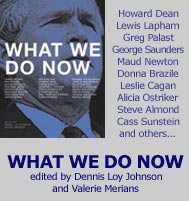
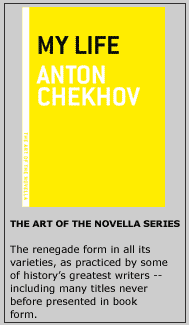
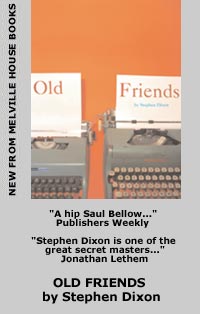
RECENTLY
UNDER–APPRECIATED
From Ig Publishing . . .
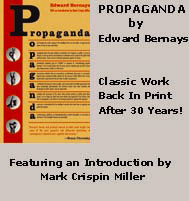
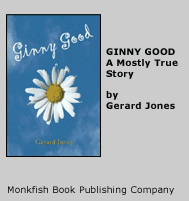

The International Bestseller
WHO KILLED DANIEL PEARL?
by Bernard–Henri Lévy
WHALE SIGHTINGS
"Crank Call"
by Thomas J. Hubschman
(from Me Three)
"Brain Spiders"
by MISSY WILKINSON
(from Prose aX)
This week's poetry:
"Not Pee Wee"
by NICK THRAN
(from Grain)
"Airport"
by ELIZABETH VOLPE
(from Briar Cliff Review)
Special edition:
POEMS FOR THE TIME
First posted in October, 2001, Alicia Ostriker's anthology of poetry that she turned to after the 9/11 attacks — including the work of Stephen Dunn, C.P. Cavafy, Marianne Moore, and others — is far and away the most popular link ever posted on MobyLives. Find out why.

Links